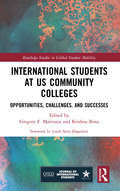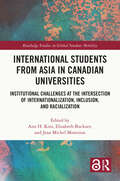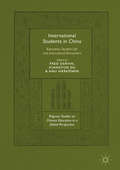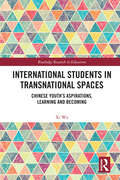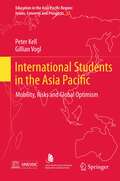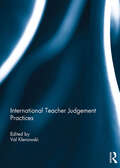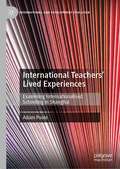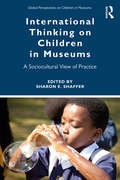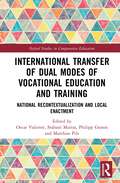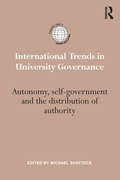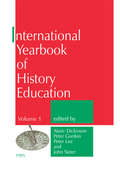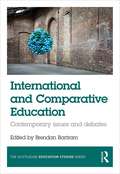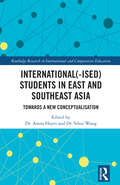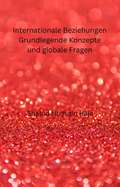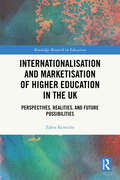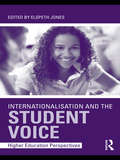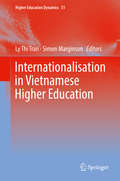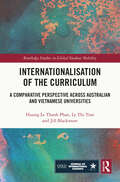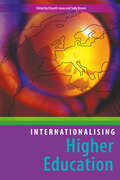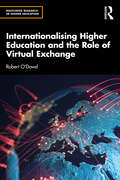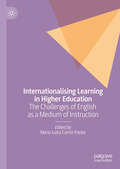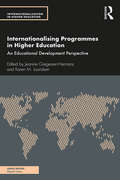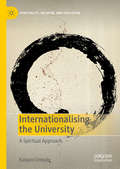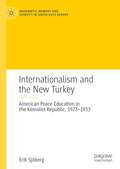- Table View
- List View
International Students at US Community Colleges: Opportunities, Challenges, and Successes (Routledge Studies in Global Student Mobility)
by Gregory F. MalveauxThis volume documents the experiences of international students and recent international initiatives at US community colleges to better understand how to support and nurture students’ potential. Offering a range of case studies, empirical and conceptual chapters, the collection showcases the unique curricula and diverse opportunities for career development that colleges can offer international students. International Students at US Community Colleges addresses issues of student access, enrolment barriers, college choice, and challenges relating to integration in academic and professional networks. Ultimately, the book unpacks institutional factors which inhibit or promote the success of international students at US community colleges to inform faculty, student affairs, administration, and institutional policy. With international students’ declining enrollment, this book considers the measures being taken by community college officials to bring continued access and equity to international students. Offering insights from a range of international scholars as well as on-the-ground case studies, this text will benefit researchers, academics, and educators with an interest in multicultural education, international and comparative education, and higher education management. Those specifically interested in educational policy and the sociology of education will also benefit from this book.
International Students at US Community Colleges: Opportunities, Challenges, and Successes (Routledge Studies in Global Student Mobility)
by Gregory F. MalveauxThis volume documents the experiences of international students and recent international initiatives at US community colleges to better understand how to support and nurture students’ potential. Offering a range of case studies, empirical and conceptual chapters, the collection showcases the unique curricula and diverse opportunities for career development that colleges can offer international students.International Students at US Community Colleges addresses issues of student access, enrolment barriers, college choice, and challenges relating to integration in academic and professional networks. Ultimately, the book unpacks institutional factors which inhibit or promote the success of international students at US community colleges to inform faculty, student affairs, administration, and institutional policy. With international students’ declining enrollment, this book considers the measures being taken by community college officials to bring continued access and equity to international students. Offering insights from a range of international scholars as well as on-the-ground case studies, this text will benefit researchers, academics, and educators with an interest in multicultural education, international and comparative education, and higher education management. Those specifically interested in educational policy and the sociology of education will also benefit from this book.
International Students from Asia in Canadian Universities: Institutional Challenges at the Intersection of Internationalization, Racialization and Inclusion (Routledge Studies in Global Student Mobility)
by Elizabeth Buckner Ann H. Kim Jean Michel MontsionThis book explores how the recruitment and retention of Asian international students in Canadian universities intersects with other institutional priorities. Responding to the growing need for new insights and perspectives on the institutional mechanisms adopted by Canadian universities to support Asian international students in their academic and social integration to university life, it crucially examines the challenges at the intersection of two institutional priorities: internationalization and anti-racism. This is especially important for the Asian international student group, who are known to experience invisible forms of discrimination and differential treatment in Canadian post-secondary education institutions. The authors present new conceptualisations and theoretical perspectives on topics including international students’ experiences and understandings of race and racism, comparisons with domestic students and/or non-Asian students, institutional discourse and narratives on Asian international students, comparison with other university priorities, cross-national comparisons, best practices, and recent developments linked to the COVID-19 pandemic. Foregrounding the institutional strategies of Canadian universities, as opposed to student experience exclusively, this direct examination of institutional responses and initiatives draws out similarities and differences across the country, compares them within the broader array of university priorities, and ultimately offers the opportunity for Canadian universities to learn from each other in improving the integration of Asian international students and others to their student body. It will appeal to teacher-scholars, researchers and educators with interested in higher education, international education and race and ethnic studies.
International Students in China: Education, Student Life and Intercultural Encounters (Palgrave Studies on Chinese Education in a Global Perspective)
by Fred Dervin Xiangyun Du Anu HärkönenAs the number of international students in Chinese higher education increases steadily, this volume is one of the first to focus on their many and varied experiences. With contributions focusing on such topics as intercultural adaptation, soft power and interculturality, language learning strategies and the intercultural, and transformations in perspective, this volume provides the reader with a broad overview of the latest advances in the field of interculturality and study abroad. While the book will appeal to a global audience of researchers, practitioners and students with an interest in Chinese higher education, it will also be of interest to all those who remain intrigued by conceptual and methodological issues of interculturality.
International Students in Transnational Spaces: Chinese Youth’s Aspirations, Learning and Becoming (Routledge Research in Education)
by Xi WuXi Wu examines how national and transnational forces and discursive logic mediate international secondary school students’ educational routes and life trajectories. Drawing upon an ethnographic research program involving Chinese students in a Canadian international secondary school, Wu employs Ong’s notion of transnational cultural logics to examine students’ lives and how they flexibly and not-so-flexibly engaged in their learning and self-making in their transnational spaces. The book provides a comprehensive understanding of international students as agentic and socially regulated subjects in their transnational routes. These insights contribute to advancing curriculum and program improvements. Furthermore, Wu applies theoretical notions of "transnationalism" and "global and transnational cultural logics" to the examination of specific phenomenon, and analyzes how cultural logics stemming from families, nations, and societies govern subjectivities in their actions and aspirations. This insightful book will be of interest to a wide range of education stakeholders, as well as scholars and researchers in comparative and international education.
International Students in the Asia Pacific: Mobility, Risks and Global Optimism
by Peter Kell Gillian VoglThis book documents the growing mobility of international students in the Asia Pacific. International students comprise over 2.7m students and it is estimated by the OECD that this will top 8 million in 2020. The great majority of them are students from the Asian countries who study in the Europe, North America and Asia. In addition countries such as Singapore, Malaysia and Hong Kong are becoming "education hubs" and are proposing to attract international students. Over 42% of international students come from Asia and this is predicted to continue with the strong presence of students from China, India, Korea and Japan continuing. A younger population, a growing middle class and shortages of quality education providers in the Asia Pacific region means that this mobility will be a feature of the future. This book explores questions around the mobility of international students in the context of the global economy and an increasingly competitive trans-national education market. It also explores questions about the experience of international students principally from the Asia Pacific region at a time of increased global insecurity and growing hostile reactions to foreigners in the post September 11th era. This book emerges from empirical work from several research projects funded by the World Bank and several community projects to support international students. The focus is also on the way in which student mobility promotes growing connection within the Asia Pacific, as well as other regions, and provides the foundations for new notions of global citizenships.
International Teacher Judgement Practices
by Val KlenowskiHuman judgements underlie all assessments regarding the quality of students’ understandings, and such judgements are conceptually complex and elusive. The study of the complexity of the judgement process is in its infancy but clearly warrants further critical investigation. However, what is demonstrated from the wide variety of international teacher judgement practices presented in this volume is that teacher judgement requires a lot more than a set of standards, criteria and annotated examples. Understandings of assessment theory by pre-service teachers through to more experienced teachers, and opportunities for all to critically reflect and consider their judgements of student work, are vital. Teachers are struggling to maintain their interpretive freedom at the local, professional level in contexts where central policies promote standardisation or ‘regulation’ of judgement practice, for accountability purposes. This book was originally published as a special issue of Assessment in Education: principles, policy & practice.
International Teachers’ Lived Experiences: Examining Internationalised Schooling in Shanghai (International and Development Education)
by Adam PooleThis book explores the emerging and under-researched phenomenon of internationalised schooling in China. It focuses on a group of “accidental” teachers who fell into teaching through happenstance or necessity, a group of teachers increasingly seeking refuge in Chinese Internationalised Schools. Chinese Internationalised Schools cater to an affluent middle class in China, offering some form of international curriculum which is taught by host country Chinese nationals and expatriate teachers. Chapters focus on three dimensions of teachers’ lived experiences of working in these schools: the intercultural, which explores teachers’ negotiations of intercultural teacher identities; the precarious, which highlights the struggles they might face at work; and the resilient, which illustrates how teachers survive—and even thrive—in the position. The author identifies a complex interplay between surviving and thriving, giving rise to the concept of “sur-thrival.”
International Thinking on Children in Museums: A Sociocultural View of Practice (Global Perspectives on Children in Museums)
by Sharon E. ShafferInternational Thinking on Children in Museums introduces current research, theory, and practice about young learners in museums around the world. The book imparts vital knowledge about the nature of childhood and children’s learning that will improve understanding of the very youngest museum-goers. Including contributions from practitioners, scholars, and consultants around the globe, this volume examines museum practices and children’s learning across a range of distinct cultural and geographic locales. The framework of the book is based on research and current thinking in the realm of developmental psychology, sociology, and anthropology, allowing the contributors to examine the evolution of early learning and children’s programs through a sociocultural lens. This broad-based look at international museum practices for children offers a rare view of the field from an important, but oft-neglected perspective: that of society and culture. International Thinking on Children in Museums will broaden understanding of museum practice across cultures and geographic regions and, as such, will be of interest to scholars and students engaged in the study of museum education, museum studies, and early learning. It should also provide a much-needed source of inspiration for museum practitioners working around the world.
International Transfer of Dual Modes of Vocational Education and Training: National Recontextualization and Local Enactment (Oxford Studies in Comparative Education)
by Matthias Pilz Philipp Gonon Oscar Valiente Srabani MaitraThis volume looks at the recontextualization that results from the international transfer of dual modes of vocational education and training (VET), typically focused on apprenticeships, in their countries’ new nation-specific and local context, highlighting the absorptive capacities and the different modes of duality in VET.Combining perspectives and data from a truly international set of contributors, the book identifies diverse translations and enactments of dual modes of vocational education and training. Using a case study approach to understand why and how education policies travel across different world regions, and how they mutate in such processes, the book ultimately provides empirical insights into the dynamics involved in the dissemination and recontextualization of global education policies. Chapters discuss local enactments, such as the views of apprentices in two states in Mexico, and an in-depth look at the Industrial Training Institute (based on the Dual System of Training) located in Gujarat, India. Further case studies stretch across the globe from contexts as diverse as China, Spain and Canada, and refer to countries such as Nigeria, Kenya, Botswana and Namibia.This book will be of use to scholars, postgraduate students and researchers in the fields of international and comparative education, vocational education and training, and adult education and lifelong learning more broadly. Policy makers working in international policy transfer may also benefit from this volume.
International Trends in University Governance: Autonomy, self-government and the distribution of authority (International Studies in Higher Education)
by Michael ShattockGovernance is becoming increasingly important in universities just as it is in the wider world of commerce and banking. Historically, universities were run by their academic communities but as mass higher education has taken root, as university research has become a critical element in national economies and as the demand for more accountability both financial and in academic performance has grown, pressure has mounted for a ‘modernisation’ of governance structures. One aspect of ‘modernisation’, particularly important in many European systems, and in Japan, has been the decision by governments to give institutions greater autonomy, more control over their budgets and legal responsibility for the employment of their staff. International trends to introduce greater competition between institutions, to encourage greater institutional differentiation and give greater play to market forces has led to an emphasis on leadership, a more systematic involvement of external stakeholders and a more ‘corporate style of governance. At the same time this has often led to a sense of loss of collegiality, a redistribution of authority and a growing gap between the ‘centre’ and the ‘periphery’ within universities. This book analyses governance change in nine major higher education systems, Australia, Finland, France, Germany, Italy, Japan, Norway, the UK and the USA, each account being the result of independent research by a leading authority in the field and describes how a convergence of governance structures has been mediated by the historical, cultural, political and social characteristics of the different systems. Michael Shattock is a leading authority on university governance; this study offers the most up to date account of governance reform in a range of higher education systems, an analysis of the common trends and an assessment of their impact on the idea of a university. It will be essential reading for academics, postgraduates and practitioners in higher education.
International Yearbook of History Education (Woburn Education Series)
by Peter Lee John Slater Peter Gordon Alaric DickinsonFirst Published in 1996. Routledge is an imprint of Taylor & Francis, an informa company.
International and Comparative Education: Contemporary Issues and Debates (The Routledge Education Studies Series)
by Brendan BartramInternational and Comparative Education offers detailed and wide-ranging illustrations of the ways in which comparison can illuminate our understanding of contemporary education systems by exploring issues in relation to specific educational sectors, from early-years and primary schooling, through to further, adult and higher education. Key areas and debates examined include: Alternative education provision Early-years pedagogy and training Spiritual, moral, social and cultural development in primary schooling Work-related learning in secondary schools The world of private tutoring Economic austerity and further education Apprenticeships and vocational education Adult education and training Higher education in a globalised world Teacher training and international rankings. Drawing on these wide-ranging themes across a number of national contexts to provoke critical thinking and reflection, each chapter includes discussion points and further reading, providing a valuable resource for all Education Studies students.
International: Towards a New Conceptualisation (Routledge Research in International and Comparative Education)
by Aneta Hayes Sihui WangThis book presents new narratives about international students undertaking transnational education (TNE) in East and Southeast Asia.With contributions from leading experts in international higher education, each chapter provides important critical arguments about the outdatedness of traditional labels that we tend to use when describing international students and their experiences. The book disrupts these narrow labels with voices and authors from Japan, Laos, China, and Vietnam to show that the categories through which we see international students overshadow the complexities of the students themselves and how their TNE experiences shape them. The book examines the traditional label of an ‘international student’ and invites readers to explore and use the alternative phrase ‘internationalised student.’This book will appeal to scholars, upper-level students, and researchers interested in international and comparative education, transnational education, migration studies, and higher education administration.
Internationale Beziehungen Grundlegende Konzepte und globale Fragen: Ein Handbuch
by Shahid Hussain RajaDies ist eine Sammlung von 20 langen Essays zu verschiedenen globalen Themen, die für diejenigen geschrieben wurden, die gerne wissen möchten, welche großen Themen und Ideen die Weltpolitik prägen, aber nicht die Zeit haben, im Internet nach einem umfassenden Verständnis zu suchen. Von der Globalisierung und der Syrienkrise auf der einen Seite bis hin zu Clash of Civilisation und dem Ende der Geschichte auf der anderen Seite behandeln diese Essays Themen, über die fast jeder nur rudimentär Bescheid weiß, aber nicht in der Lage ist, sie zu erklären. Terrorismus, Privatisierung, Korruption, Agrarreformen usw. sind einige der Themen, über die jeder spricht, aber nicht in der Lage ist, sie systematisch zu diskutieren. Wir haben versucht, ihm/ihr in diesen Aufsätzen genügend Material zur Verfügung zu stellen, damit er/sie dies tun kann. Einstein hat einmal gesagt: "Wenn man es einem 6-Jährigen nicht erklären kann, weiß man es selbst nicht". Nun, diese Aufsätze sind nicht für 6-Jährige gedacht, sondern für alle, die sich für globale Themen interessieren und sie aus der richtigen Perspektive betrachten wollen. Diese Aufsätze sind das Ergebnis gründlicher Recherchen und stellen in laienverständlicher Sprache die Grundlagen jedes Themas dar, wobei das Triviale beiseite gelassen wird. Angesichts der Fülle an Material, das im Internet oder in gedruckter Form verfügbar ist, stellt sich die logische Frage: "Was ist neu an diesem Buch?". Nun, nur zwei Dinge - ein leichteres Verständnis der komplexen globalen Themen und ein leichtes Einprägen der wichtigsten Punkte für die Beantwortung der Fragen in der Prüfung oder während einer Diskussion. Obwohl wir keinen Anspruch auf Originalität des Materials erheben, werden Sie doch unsere Beiträge zur Literatur zu verschiedenen behandelten Themen bemerken Übersetzt mit www.DeepL.com/Translator (kostenlose Version)
Internationalisation and Marketisation of Higher Education in the UK: Perspectives, Realities, and Future Possibilities (Routledge Research in Education)
by Zahra KemicheThis timely volume sets out the author’s novel concept of the Organic model of internationalisation, developed using participants’ perceptions, lived experiences, and recommendations for a better sustainable future of HE, and explores its broader application in the context of higher education.Using the qualitative IPA (Interpretative Phenomenological Analysis) approach, chapters showcase the lived experiences and subjective perspectives of individuals around the paradox that internationalisation presents, the distorting effects of institutional power, and the market- and ethics-based concerns of internationalisation in higher education. Drawing on an in-depth empirical study conducted using participant observation and interviews with participants from three UK universities, the book proposes a framework for redefining the global discourse of HE through the Organic model and urges the need for a compromise between profit and ethics to the benefit of both organisations and individuals. The book thoroughly discusses racist practices and introduces the concepts of “xeno-racism” and “angelism” , ensuring that the proposed approach is authentic and responsive to the diverse experiences of the student body.Showcasing a model with international potential and ramifications, this book will appeal to researchers, academics, and postgraduate students in higher education, internationalisation, and international study mobility. Practitioners and policymakers may also benefit from the volume.
Internationalisation and the Student Voice: Higher Education Perspectives
by Elspeth JonesThis groundbreaking volume seeks to take the first steps in analyzing the impact of internationalization initiatives from student perspectives. As programs are increasingly delivered overseas and we seek to offer domestic students an international experience, how do we know what works for students and what does not? Encompassing the fast-growing global imperative is a significant challenge for higher education and this collection identifies opportunities for enrichment of the learning environment, with all chapters based on direct research with students. The book provides essential reading for anyone engaged in internationalization and wishing to learn more about the impact on students of a range of initiatives in order to apply the lessons in their own contexts. Chapters include student responses to the following learning contexts: "traditional" international contexts, where students study outside their home country for shorter or longer periods; "trans-national" programs where students study at home or in another country and faculty from the awarding university fly in to deliver courses; domestic students studying in their home country, with staff seeking to internationalize the curriculum; students having transformational international experiences in other countries through service learning/volunteering, or study abroad
Internationalisation in Vietnamese Higher Education (Higher Education Dynamics #51)
by Simon Marginson Ly Thi TranThis book focuses on models, strengths, opportunities, constraints and tensions in internationalisation in Vietnamese higher education. It reflects on key concepts from contemporary theories and models of internationalisation and discusses the implications for innovation, flexibility and responsiveness to local needs in Vietnam. Based on empirical research, theoretical knowledge and the experiences of researchers from Vietnam and overseas, the book draws out the distinctiveness and complexity of internationalisation practices and charts a way forward. It examines the key drivers and dimensions of internationalising Vietnamese higher education, and compares internationalisation in Vietnam to that in other countries. It clarifies and discusses tensions related to the appropriation of ‘Western’ internationalisation practice and models, and neo-liberal ideologies, to the local context of Vietnam. It provides readers with insights into government policy, quality assurance and benchmarking strategies, curriculum, the impact of international organisations on higher education, international student mobility, transnational education, employability, brain drain and brain gain and brain circulation.
Internationalisation of the Curriculum: A Comparative Perspective across Australian and Vietnamese Universities (Routledge Studies in Global Student Mobility)
by Ly Thi Tran Jill Blackmore Huong Le Thanh PhanThis book compares the nature and practice of internationalisation of the curriculum at the policy, institutional, and classroom levels in Vietnam and Australia: the former an Asian, developing, and sending country of international students, and the latter an Anglophone, developed country, and a major education export provider.By examining curriculum internationalisation practices in these two vastly different socio-cultural contexts, the book contributes to the understanding of the magnitude and the range of differences regarding national and institutional responses to the common call for curriculum internationalisation. It addresses the impacts of the latest technological, political, economic, and sociocultural developments and COVID-19 on higher education internationalisation, as well as the digitalisation of international education. Crucially, it responds to a critical gap in the literature by not only investigating curriculum internationalisation policies and their implementation, but how faculty staff and students experience and engage with internationalisation of the curriculum in their home context, and how they position themselves and are positioned by the structural conditions with regard to curriculum internationalisation. The authors utilise document analysis, in-depth interviews, and focus groups from a four-year research project. The research employs a unique conceptual framework combining practice architectures theory and Barnett and Coate’s conceptualisation of curriculum as knowing-acting-being.Providing rich inputs for new ways of thinking and doing to enhance educational quality and the learning experiences of all students, the book is a valuable resource for researchers, academic staff, practitioners, leaders, and students in higher education and international and comparative education.
Internationalising Higher Education
by Sally Brown Elspeth JonesWith increasing numbers of international students, this book explores how best to broaden the approaches to learning and teaching in the higher/further education environment. Rather than seeing internationalization as a problem to be addressed, this text embraces the opportunities for the enrichment of the learning environment through a values-driven approach to internationalization. Taking a positive and practical approach to internationalizing higher education, the book considers a range of questions about how to bring in global perspectives to the learning environment and education provision. Packed with case studies and vignettes from around the globe, the book proposes that the international student lies at the heart of the university as a source of cultural capital and intentional diversity, enriching the learning experience, enhancing staff experience and building a more powerful learning community.
Internationalising Higher Education and the Role of Virtual Exchange (Routledge Research in Higher Education)
by Robert O'DowdThis volume introduces Virtual Exchange (VE) as an innovative form of online intercultural learning and investigates the myriad of ways VE is being carried out across universities, ultimately arguing for its integration into university internationalisation policies and course curricula. Against the backdrop of increased digitalisation initiatives throughout universities given the effects of the pandemic, chapters focus not only on providing new research findings, but also on providing a comprehensive introduction and argumentation for the use of VE in university education and also in demonstrating how it can be put into use by both university decision-makers and educators. Reviewing the limitations of the activity, this timely work also fundamentally posits how VE and blended mobility more broadly could be developed in future higher education initiatives. This book will be of interest to researchers, academics, scholars, and students involved with Open & Distance Education and eLearning, approaches to internationalisation in education, and the study of higher education more broadly. Those interested in innovative methods for teaching and learning, as well as educational research, will also benefit from this volume.
Internationalising Learning in Higher Education: The Challenges of English as a Medium of Instruction
by María Luisa Carrió-PastorThis edited book examines the use of English as a Medium of Instruction (EMI) in a variety of international higher education contexts. The internationalization of education – indicated by increasing mobility of students, staff and ideas, as well as by policies and programmes put in place to facilitate educational exchange - has led to increasing adoption of English as a Lingua Franca (ELF) for educational purposes. In this book, the authors present the results of empirical research into the implementation, assessment, development and use of EMI programmes in different settings, presenting the case for more structured training of teachers and staff. It will be of interest to second/foreign language teaching and administrative staff, as well as anyone else involved in teaching in English at higher education level.
Internationalising Programmes in Higher Education: An Educational Development Perspective (Internationalization in Higher Education Series)
by Jeanine Gregersen-HermansThis book addresses challenges that higher education institutions face when bridging the gap between internationalisation as a key university strategy and their delivery of interculturally competent and responsible graduates. Combining international case studies and research outcomes, it provides an in-depth understanding of the role educational developers can play in the internationalisation of higher education and in the provision of an internationalised learning experience for all students. The book situates international education in global and local contexts and contributes to the design and delivery of internationalised curricula in very concrete terms. In doing so, it suggests how academic staff may enhance the quality of their programmes by leveraging the opportunities of international classrooms where students have diverse academic, linguistic, and cultural backgrounds. The content of the book is therefore also foundational for continuing professional development (CPD) programmes that enhance staff competences for designing and teaching inclusive internationalised programmes and include topics such as: An international competence profile for educational developers Intercultural competence as a graduate attribute Internationalised curriculum design and delivery Intercultural group dynamics The role of languages in internationalised higher education classrooms Reflective processes for teaching and learning in the international classroom This book is essential reading and a go-to resource for any academic looking to internationalise their education programmes. It will also be of interest to those directly involved in curriculum development, learning, and teaching as well as those who have more strategic responsibilities within and beyond HEIs, or who are involved in higher education research.
Internationalising the University: A Spiritual Approach (Spirituality, Religion, and Education)
by Kalyani UnkuleThis book takes a critical look at the internationalisation of higher education and argues for the importance of grounding education in spiritual perspectives. Using spiritual traditions to review the practices, programmes, and philosophies of learning that internationalise universities, the author proposes a paradigm for internationalisation that respects other ways of knowing. This focus seeks to decolonize knowledge and promote intercultural understanding, as well as help students achieve holistic personal development while studying abroad.
Internationalism and the New Turkey: American Peace Education in the Kemalist Republic, 1923-1933 (Modernity, Memory and Identity in South-East Europe)
by Erik SjöbergThis book examines international education in Turkey after World War I. In this period, a movement for peace and international education among American educators emerged. This effort, however, had to be reconciled with the nationalist projects of new nation-states emerging from the war. In the case of the Near East that meant coming to terms with the radically nationalist modernization project of Kemal Atatürk’s Turkish Republic. Using the case of Robert College, an American educational institution in Istanbul, which aimed to foster a future local elite of a multi-ethnic and multi-religious student body, the book sheds light on the negotiation between two conceptions of modernity, as represented by American internationalist ideals and the tenets of Kemalism the Westernizing, yet deeply ethnocentric national ideology of post-1923 Turkey. Based on recently declassified archival sources, this study addresses the educational intentions and strategies for adjustment of college faculty. It also offers a rare insight into the mindset of young students attempting to make sense of what internationalism and religious, ethnic and national identity meant in the Ottoman past and in the new republican Turkey. Focusing on Robert College and the forgotten case of its dean and social studies instructor, Dr. Edgar Jacob Fisher, it addresses the little-researched field of internationalism and peace education in interwar Turkey.
